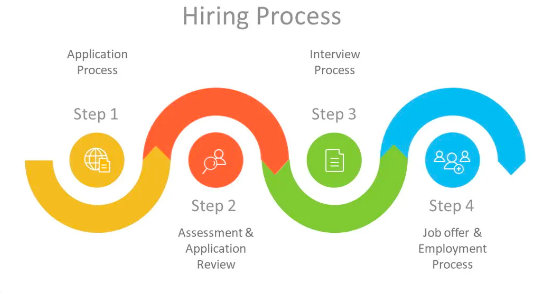- Current HR and Sales Situation in SMEs?
Recruiting and employing salespeople in SMEs is becoming increasingly challenging due to the following factors:
- Lack of a dedicated sales recruiting department within the company: Small companies may have HR handling recruitment for multiple departments.
- Insufficient investment in effective sales channels in terms of time and money: Often reactive, only actively seeking salespeople when the need arises, leading to hasty hiring decisions without thorough evaluation.
- Sales employees have numerous job opportunities from various companies: Candidates receive multiple interview invitations, sometimes leading to no-shows even after scheduling with HR.
- Incomplete or nonexistent interview processes within the company.
- Lack of genuine emphasis on efficient sales recruitment within the company.
- Sales professionals can easily find part-time, freelance, delivery, or gig jobs elsewhere.
- Sales employees enter without clear onboarding or trial period plans: Lack of guidance can lead to confusion and demotivation.
- Ambiguous or non-transparent salary, bonus, benefits, and commission structures can lead to internal conflicts.
- Salespeople may not see a clear career development path within the company.
- Sales are assigned unrealistic targets without understanding how they can achieve them.
- Salespeople who join but see no results within 3-4 months due to a lack of leads, guidance, or mentoring tend to seek new opportunities.
- Managers who set extremely high revenue KPIs may not dedicate time to training, guiding, or assisting the sales team.
- Ineffective sales policies and incentives may not motivate the sales team.
- Salespeople are tasked with too many roles: sales, market development, debt recovery, customer service, implementation, etc.
- HR professionals may be promoted from administrative or assistant roles and may not fully understand HR responsibilities, making it challenging to effectively support the sales department.
- Sales managers who have risen from successful sales positions without formal HR training may struggle to manage their teams effectively.
- Over time, HR and Sales may become disconnected, with each department focusing on its own tasks rather than the company’s overarching goals.

- What Is HR for Sales?
Many businesses are now starting to pay attention to how they can hire the right salespeople who fit their company. This requires having an HR department that understands the company’s business and the roles of the sales team so that they can contribute to the sales team’s plans and strategies.
HR and Sales are now becoming aligned with the company’s common goals (Business Goals) rather than operating independently as separate departments.
Many multinational corporations, foreign direct investment (FDI) companies, and large conglomerates have shifted toward HR Business Partner (HRBP) models, where HR partners with various business units to analyze compensation and benefits packages for different levels, recruitment, legal matters, etc. These HRBP managers must possess knowledge of both business and human resource management. However, small and medium-sized enterprises (SMEs) in Vietnam may not yet fully implement the HRBP model. HR may need to multitask and collaborate effectively with department heads to achieve the best results.
To achieve this, HR in SMEs must understand the Sales department, Sales management, and what support the Sales team needs to be effective. Conversely, Sales managers must cooperate to help HR support them effectively. The ultimate goal is to achieve the company’s Business Goals.
- Why Should You Care About HR for Sales?
Hiring the wrong employees can be time-consuming for senior management and costly for the company. Ineffective execution of sales strategies due to incorrect or inadequate recruitment can lead to problems.
For example, a company may plan for expected revenue of 500 billion VND in 2019, with 30% of this coming from the Mekong region (150 billion VND). However, in practice, recruiting in the Mekong region falls short, resulting in unrealized revenue expectations. This example highlights that HR now needs to play a more significant role in the company’s plans and sales strategies.
Department heads who are not skilled in management and only excel in their field of expertise may struggle to manage their sales teams effectively. If HR can dedicate time to train Sales department heads in the essentials of human resource management, these department heads can better align their department’s goals with HR’s assistance.
If HR takes the initiative to research and analyze Sales activities alongside Sales department heads, the collaboration between HR and Sales will be highly effective in achieving Sales plans and strategies.
- What HR Functions Support Sales Management, Training, and Development?
The HR functions that support sales management, training, and development include:
- Recruitment and Interviewing
- Probationary Period Assessment
- Employee Document Verification
- Compensation and Benefits Package Design for Sales
- Salary Grades and Career Paths for Sales Positions
- Employee Handbooks
- Corporate Culture
- Internal Communication and Team Building
- Performance Evaluation and Monthly Sales Review
- Salary Increase and Promotion Evaluation Cycles
- Employee Departures
- Labor Laws: Probationary Contracts, Permanent Contracts, etc.
- Support in Developing Effective Key Performance Indicators (KPIs) for Sales
- Sales Competency Dictionary
- What Aspects of Sales Management Should HR Understand to Support Sales?
HR needs to understand various aspects of Sales management to provide effective support. These aspects include:
- Business Plans
- Sales Strategies
- Recruitment Plans
- Sales Team Training Plans
- Management and Implementation
- Sales Budget Management
- Sales KPIs (Monthly or Fixed)
- And more…
- Implementation Roadmap:
a. Building a Mindset from Scratch:
- Transparent salary and bonus systems
- “More work, more reward” philosophy
- Discourage early exits (create backup recruitment plans)
- Be well-prepared: market information, competitors, customers, products, internal information, etc.
- Sales employees should be trained from the start, with a clear plan from readiness to full performance.
- Do not challenge Sales; provide clear plans for learning, acting, presenting, and encourage interaction, collaboration, and seeking support.
- Managers should focus on supporting, training, guiding, and supervising, rather than solely pursuing individual sales targets.
- A sales employee’s journey: Ready → Full Performance (Warrior)
b. Task Checklist:
- Establish a clear organizational structure and functional structure according to the Sales department’s organizational chart to serve Sales targets and the company’s Business Goals over 1 to 3 years.
- Develop detailed job descriptions for each position (MTCV).
- Create KPIs for each position (monthly KPIs may be considered).
- Establish monthly performance evaluation criteria for Sales.
- Design salary scales for each position.
- Develop career paths for the Sales department.
- Create a competency dictionary (criteria: ASK) for each position (determine core competencies).
- Recruitment processes: Form templates
- Interview processes: Set of questions, interview evaluation sheets with fewer criteria based on the competency dictionary.
- Probationary processes: A 60-day trial plan consisting of 8 weeks with clear daily tasks for new employees.
- 3-month processes for official employment; a 90-day plan for permanent employees.
- Sales policies (Sales Policy)
- Self-calculating salary tables for Sales.
c. Implementation Timeline:
- Months 1 and 2: Finalize all processes, forms, evaluation criteria, sales policies, etc., and discuss with the Board of Directors (BOD) and the Sales team.
- Month 3: Prepare content, including market information, products, competitors, customers, internal policies, and internal management.
- Months 4, 5, and 6: Officially launch and test, adjusting as necessary based on real-world experiences.
- Months 7 to 12: Full implementation.
- Notes:
- Implementation requires agreement from the BOD.
- HR and Sales should share the company’s common goals.
- Weekly updates should be conducted to ensure effective collaboration between HR and Sales.
These are some HR for Sales guidelines to help SMEs recruit, hire, retain, and dismiss employees more effectively.




Leave a Reply